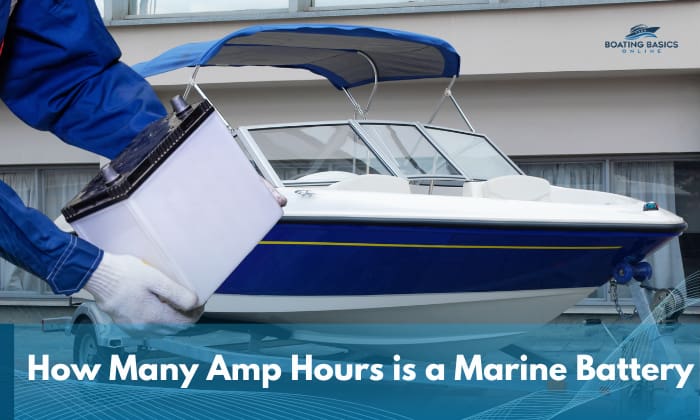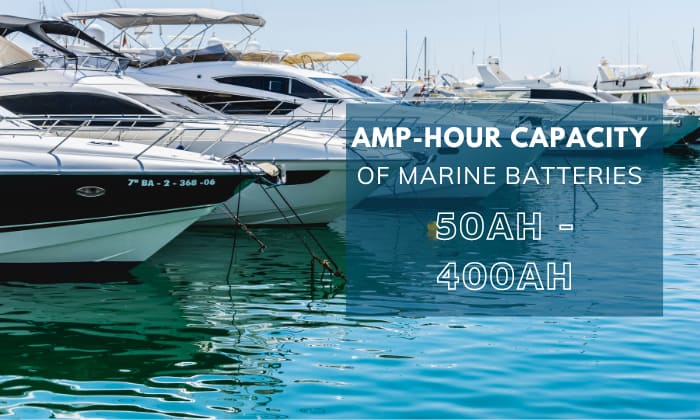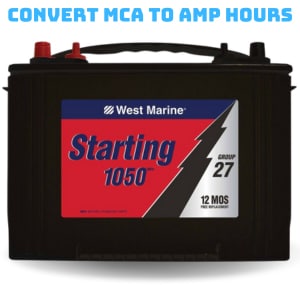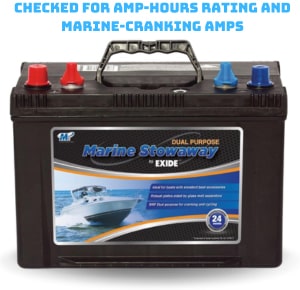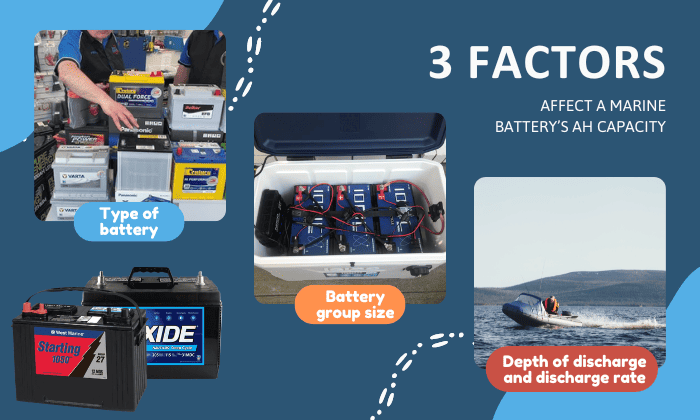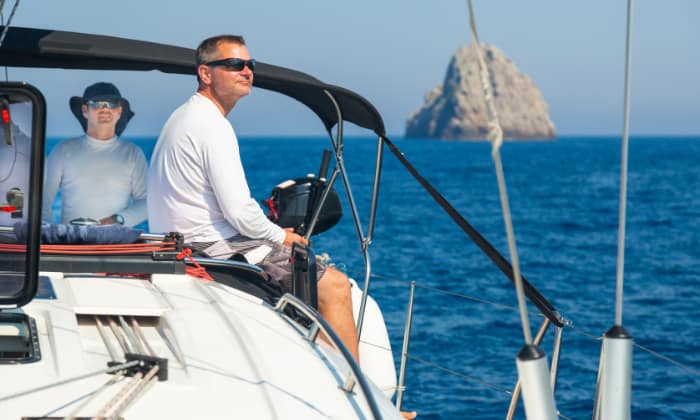People who ask “How many amp hours is a marine battery?” often want to estimate how long they can run specific accessories or want to make sure it meets their power requirements.
The answer depends on the specific brand and type of marine battery that they have. Most 12-volt battery products for boats available in the market can have as low a rating as 16Ah while others have 105Ah.
Deep-cycle varieties are normally rated from 60Ah to 300Ah – with 100Ah being the most common.
Table of Contents
Amp-hour Capacity of Marine Batteries
Now, I took “marine battery” in the most literal sense when I mentioned the ranges above – batteries that are compatible with boats. More often than not, boaters immediately think of a deep-cycle battery when a marine battery is mentioned.
In reality, though, there are other types like starter batteries and hybrids (dual-purpose). Moreover, there are products that don’t reveal their Ah rating, and only show the marine battery amps.
If that is mainly your concern, then I suggest you skip to the fourth section, “How to find out how many amp hours is your marine battery?” below.
The reason you can’t expect the amp-hour capacities of marine batteries to be rated the same is because most manufacturers want to be able to cater to numerous power loads. Just look at the various Ah ratings of 12V Li Time batteries to see for yourself.
- 50Ah boat batteries are common, but obviously, there are even higher-capacity batteries that have 400Ah, which immediately goes past the range above.
I know anglers who prefer the latter for its ability to provide power for entire fishing seasons. What’s certain is there are plenty of options and variations for everyone.
Personally, I favor 12V because it’s the most common marine battery rating, but there are 24V and 36V products as well. The voltage required ultimately depends on the watercraft’s size and the motor it’s using.
Variations in Amp-hour Ratings Among Battery Types
Take a look at a standard amp hours chart for marine batteries, and it will likely only take you a few seconds to see that Ah ratings do vary. Fact is the type of battery you have will determine the amp-hour rating.
Most boat battery setups often go like this:
- Single Battery Setup – One battery handles both the starting and house loads (i.e. powering gadgets, appliances, electronics, lights, etc.).
- Dual Battery Setup – Don’t confuse this with a dual-purpose battery. This is simply an installation wherein two separate batteries handle either starting (starter battery) or the electronics’ loads (the house battery).
1. Starter batteries
If you only need a starter marine battery, you really should be more concerned with the starting amps you need per horsepower. That is unless you want to use them to handle your house load as well, for which you will need to convert MCA to amp hours.
With that said, people often need to check marine cranking amps (MCA) for this battery type because they’ll only be used for short bursts of power. Consequently, you can expect that kind of battery to have a lower Ah rating (if they’ll be rated for that at all).
Do take note that MCA is different from the cold-cranking amps measured in car batteries. The former is often 20% to 25% higher than the latter.
2. Deep-cycle and dual-purpose batteries
As for a deep-cycle battery that’s meant for either setup (starter and house), you have to take a look at the amp-hour ratings. Its dual-purpose counterparts, on the other hand, will need to be checked for both their amp-hours rating and marine-cranking amps.
On the whole, the differences in amp-hours can be observed easily in the various deep-cycle and dual-purpose products you can buy in the market at present.
Factors Affecting Amp-hour Capacity
Based on what my research on the subject, here are the factors that affect a marine battery’s Ah capacity:
- Type of battery – Whether you’ll use a starter, deep-cycle, or dual-purpose is often determined by your intended application for the marine battery as I’ve explained.
- Battery group size – Group sizes that have a higher number will have equally higher amp-hour ratings. As such, you can expect group 31 and 8D batteries to deliver more power throughout the day than their 24 and 27 counterparts.
- Depth of discharge and discharge rate – This refers to the depth to which a deep-cycle battery is discharged. It may affect Ah capacity, leading to a lower overall capacity over time. Though, this isn’t much of an issue for lithium-ion batteries.
How to Find Out How Many Amp Hours is Your Marine Battery
If your product doesn’t readily reveal its Ah rating, you can estimate it using the reserve capacity. That number should be indicated in minutes. Usually, the reserve capacity is slightly higher than double the Ah rating.
For example, if your reserve capacity is 210 minutes, we can surmise that the battery has an 80-85 Ah rating. By no means does this always hold true, there’s also the fact that capacity dwindles as the battery ages or undergoes wear and tear.
Don’t hesitate to contact the manufacturer for the information you need. That’s arguably more time-saving than doing inaccurate tests and making rough estimations.
Lastly, to supplement the information I’ve shared, consider watching this entire video:
Conclusion
So, in the end, the answer to “How many amp hours is a marine battery?” is: it depends. The amp-hour rating of a marine battery plays a crucial role in determining its capacity and overall performance on the water.
Understanding how many amp hours a marine battery has is essential for ensuring that it can meet the power demands of your boating activities, whether it’s running essential electronics, powering trolling motors, or supplying energy for various appliances onboard.
Read more: Average lifespan of boat batteries.

“My intention from the first day establishing Boating Basics Online is to provide as much help as possible for boaters who want to experience a first safe and convenient trip. So feel free to join us and share your beautiful journeys to the sea!”

